2015年10月00832英语词汇学真题
00832英语词汇学 1404试题
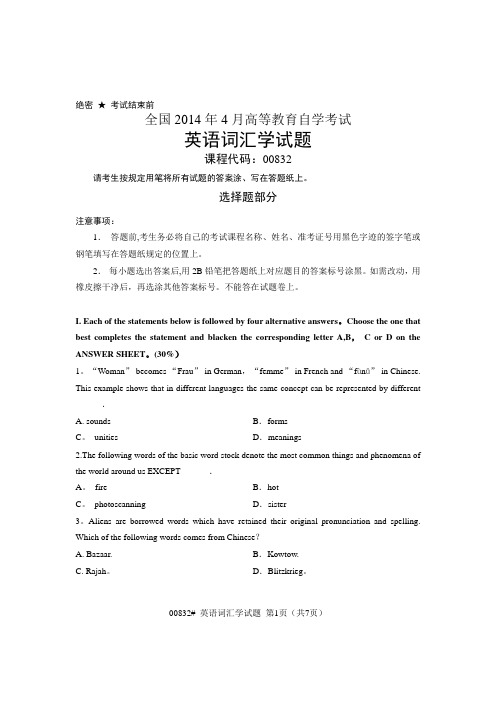
绝密★考试结束前全国2014年4月高等教育自学考试英语词汇学试题课程代码:00832请考生按规定用笔将所有试题的答案涂、写在答题纸上。
选择题部分注意事项:1.答题前,考生务必将自己的考试课程名称、姓名、准考证号用黑色字迹的签字笔或钢笔填写在答题纸规定的位置上。
2.每小题选出答案后,用2B铅笔把答题纸上对应题目的答案标号涂黑。
如需改动,用橡皮擦干净后,再选涂其他答案标号。
不能答在试题卷上。
I. Each of the statements below is followed by four alternative answers。
Choose the one that best completes the statement and blacken the corresponding letter A,B,C or D on the ANSWER SHEET。
(30%)1。
“Woman”becomes “Frau”in German,“femme”in French and “fùnǔ”in Chinese. This example shows that in different languages the same concept can be represented by different ______.A. sounds B.formsC。
unities D.meanings2.The following words of the basic word stock denote the most common things and phenomena of the world around us EXCEPT ______.A。
fire B.hotC。
photoscanning D.sister3。
Aliens are borrowed words which have retained their original pronunciation and spelling. Which of the following words comes from Chinese?A. Bazaar. B.Kowtow.C. Rajah。
00832英语词汇学1107全国试题
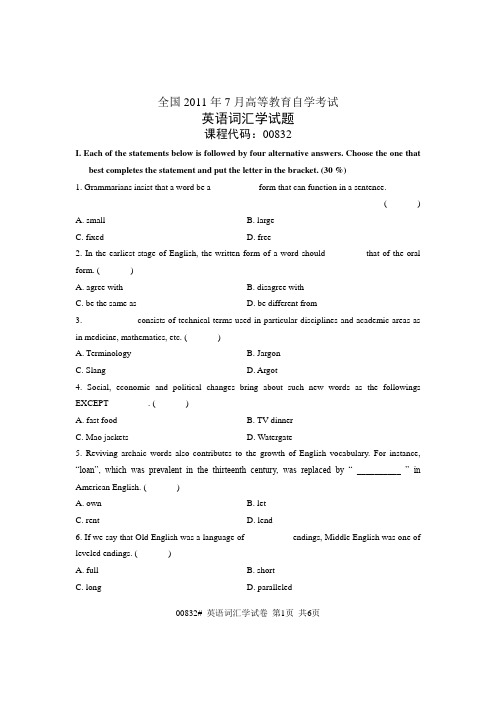
全国2011年7月高等教育自学考试英语词汇学试题课程代码:00832I. Each of the statements below is followed by four alternative answers. Choose the one thatbest completes the statement and put the letter in the bracket. (30 %)1. Grammarians insist that a word be a __________ form that can function in a sentence.( ) A. small B. largeC. fixedD. free2. In the earliest stage of English, the written form of a word should ________ that of the oral form. ( )A. agree withB. disagree withC. be the same asD. be different from3. ____________consists of technical terms used in particular disciplines and academic areas as in medicine, mathematics, etc. ( )A. TerminologyB. JargonC. SlangD. Argot4. Social, economic and political changes bring about such new words as the followings EXCEPT_________. ( )A. fast foodB. TV dinnerC. Mao jacketsD. Watergate5. Reviving archaic words also contributes to the growth of English vocabulary. For instance, “loan”, which was prevalent in the thirteenth century, was replaced by “ __________ ” in American English. ( )A. ownB. letC. rentD. lend6. If we say that Old English was a language of __________ endings, Middle English was one of leveled endings. ( )A. fullB. shortC. longD. paralleled00832# 英语词汇学试卷第1页共6页7. The plura l morpheme“-s” is pronounced as /z/in the following words EXCEPT ______________. ( )A. bottlesB. eggsC. zoosD. maps8. There is/are _____________ free morphemic word(s) in the following words: wind, man, reddish, collection. ( )A. lB. 2C. 3D. 49. The following words have inflectional affixes EXCEPT ____________. ( )A. likesB. dislikeC. likingD. liked10. The most productive means of word-formation are the following EXCEPT _______________.( ) A. affixation B. blendingC. compoundingD. conversion11. Prefixes generally do not change the __________ of the stem. ( )A. meaningB. formC. word classD. pronunciation12. The word “dorm” is formed by _________clipping. ( )A. backB. frontC. phraseD. front and back13. The word “reading-lamp” is _______ motivated. ( )A. onomatopoeicallyB. morphologicallyC. semanticallyD. etymologically14. The synonymous pair of “ask-question” has the same___________. ( )A. motivationB. valueC. functionD. concept15. In the sentence “East or west, home is best”, “home” has its __________ meaning of “family, safety, love”, etc. ( )A. grammaticalB. connotative00832# 英语词汇学试卷第2页共6页C. stylisticD. collocative16. Semantically, a word which is related to other words is related to them in____________。
00832英语词汇学复习资料

《英语词汇学》复习资料以下是我整理的英语词汇学的资料。
我在考的时候主要就是靠这个东东。
希望对还没有过的人有所帮助。
大家请注意:笔记中大多数是以名词解释的形式出现的,这些是绝对的基础,应该一字不漏的背下来。
其实不少简答题也就是几个定义的汇总,再加上个例子就可以拿满分了。
区分两个词的区别,主要还是指明其各自的定义。
第一章1. Word —— A word is a minimal free form of a language that has a given sound and meaning and syntactic function.2. There is no logical relationship between sound and meaning as the symbolic connection between them is arbitrary and conventional. E.g. “woman” means ’Frau’ in German,’Femme’ in French and ’Funv ’in Chinese. On the other hand, the same sound /rait/ can mean right, rite and write,though denoting different things, yet have the same sound.3. The difference between sound and form result from 4 major factors.(At least 80%of the English words fit consistent spelling patterns)a). the internal reason is English alphabet does not have a separate letter to represent each sound in the language.b). Pronunciation has changed more rapidly than spellingc). Influence of the work of scribes/printing freezes the spelling of words in 1500d). Borrowing of foreign language4. Vocabulary —— Vocabulary is most commonly used to refer to the sum total of all the words of a language. It can also refer to all the words of a given dialect, a given book, a given subject and all the words possessed by an individual person as well as all the words current in a particular period of time in history.The general estimate of the present day English vocabulary is over 1 million words.5.Classification of Words—by use frequency, by notion, by origin1). Basic word stock – the foundation of the vocabulary.1. all national character (most important)– natural phenomenamost common things and phenomena of the human body and relations world around us names of plants and animalsaction, size, domain, statenumerals, pronouns, prep. ,conj.2. stability – they donate the commonest thing necessary to life, they are like to remain unchanged. Only relative, some are undergoing some changes. But the change is slow.e.g. arrow, bow, chariot, knight – pastelectricity, machine, car, plane —— now3. productivity – they are mostly root words or monosyllabic words,they can form new words with other roots and affixes.e.g. foot – football, footage, footpath, footer4. polysemy – often possess more than one meaning. Become polysemous.e.g. take to move or carry from one place to anotherto remove5. collocability – quite a number of set expressions, idiomatic usages,proverbial saying and otherse.g. heart – a change of heart, a heart of goldNon-basic vocabulary ——1. terminology – technical termsphotoscanning, hepatitis, indigestion, penicillin, algebra,trigonometry, calculus2. jargon – specialized vocabulary in certain professions.Bottom line, ballpark figures, bargaining chips, hold him back, hold him in, paranoid3. slang —— substandard words often used in informal occasionsdough and bread, grass and pot, beaver, smoky, bear, catch,holler, Roger, X-rays,Certain words are labeled slang because of their usage.4. argot – words used by sub-cultured groupscan-opener, dip, persuadercant, jargon , argot are associated with, or most available to,specific groups of the population.5. dialectal words – only by speakers of the dialectbeauty, chook, cocky, station, auld, build, coo, hame,lough, bog6. archaisms – words no longer in common use or restricted in use. In older poems, legal document and religious writing or speech.7. neologism – newly created words with new meaning e.g. microelectronics, futurology, AIDS, internet, E-mailold meaning acquired new meaning e.g. mouse, monitor2). Content word (notional word)– denote clear notions.Functional word (empty word, form word)– do not have notions of their own, express the relation between notions, words and sentences.a. Content words constitute the main body of the English vocabulary are numerous.Functional words are in a small number.b. Content words are growing.Functional words remain stable.c. Functional words do far more work of expression than content words.3). Native words – are words brought to Britain in the 15 century by the German tribes. Ango-Saxon Words, 50,000-60,000What is true of the basic word stock is also true of native world. More are1. neutral in style (not stylistical specific )2. 2.frequent in use (in academic fields and science French, Latin or Greek are used)(usage 70-90%)Borrowed words (loan words, borrowing)– words taken over from foreign language. 80%According to the degree of assimilation and manner of borrowing, we can bring the loan words under 4 classes.1.Denizens – words borrowed early and now are well assimilated into English language.e.g. port from portus(L) shift, change, shirt, porkcup from cuppa(L)2.Aliens – retained their original pronunciation and spellinge.g. décor(F) blitzkreeg(G) emir, intermez, rowtow, bazaar,rajar, status quo3.translation loans – formed from the existing material in the English language but modeled on the patterns taken from another language.1). Word translated according to the meaninge.g. mother tough from lingua maternal(L)black humor from humor noirlong time no see, surplus value, master piece2). Words translated according to the sounde.g. kulak from kyrak(Russ)lama from lama(Tib)ketchuptea4. Semantic loans – their meaning are borrowed from another languagee.g. stupid old dumpnew sassydream old joy and peacepioneer old explorer/person doing pioneering worknew a member of the young pioneerfresh old impertinent, sassy, cheeky第二章Indo-European language family (Europe, the Near East, India)Balto –Slavic Indo-Iranian Italic GermanicPrussian Persian Portuguese NorwegianLithuanian Hindi Spanish IcelandiePolish Italian DanishBulgarian Roumanian SwedishSlovenian French EnglishRussian GermanAlbanian Armenian Celtic HellenicIrish GreekBretonScottish2. History (时间,历史事件,特征)1) Old English (450-1150) totally 50,000-60,000 wordsThe 1st people known to inhabit England were Celts, the language was Celtic.The second language was the Latin of the Roman Legions.The Germanic tribes called angles, Saxons and Jutes and their language, Anglo-Saxon dominated and blotted out the Celtic. Now people refer to Anglo-Saxon as old English.At the end of 6th century, the introduction of Christianity has a great impact on the English vocabulary.The common practice was to create new words by combining two native words.In the 9th century, many Scandinavian words came into English. At least 900 words of Scandinavian are in modern English, our daily life and speech.特点: highly inflected languagecomplex endings or vowel changes (full ending)2) Middle English (1150-1500) English, Latin, FrenchUntil 1066, although there were borrowings from Latin, the influence on English was mainly Germanic. But the Norman Conquest started a continual flow of French words into English.By the end of the 13th century, English gradually come back into public areas.Between 1250 and 150 about 9000 words of French origin come into English. 75% of them are till in use today.As many as 2500 words of Dutch origin come into English.特点: fewer inflectionsleveled ending3) Modern English (1500-up to now) early modern English (1500-1700)late modern English(1700-up to now)The Renaissance, Latin and Greek were recognized as the languages of the Western world’s great literary heritage.The Industrial Revolution was in the mid-17 century. With the growth of colonization, British tentacles began a stretching out of to every corner of the globe, thus enabling English to absorb words from all major languages of the world.After World War II, many new words have been created to express new ideas, inventions and scientific achievements.More words are created by means of word-formation.thousands and thousands of new words have been entered to express new ideas inventions, and scientific achievements.more words are created by means of word-formation.in modern English, word endings were mostly lost with just a few exceptions English has evolved from a synthetic language to the present analytic language.science and technology terms make up about 45% of new words. words associated with life-style constitute of 24% and social and economic terms amount to over 10% .mention should be made of an opposite process of development i.e. old words falling out if use.特点: ending are almost lost.3. Three main sources new words1.The rapid development of modern science and technology2.Social, economic and political changes3.The influence of other cultures and languages4. Three modes of vocabulary development1. Creation – the formation of new words by using the existing materials, namely roots, affixes and other elements. (This is the most important way of vocabulary expansion.)2. Semantic change - an old form which take on a new meaning to meet the new need.3. Borrowing – to take in words from other languages.(particularly in earlier time)4. (Reviving archaic or obsolete)French 30%, Latin 8%, Japanese Italian 7%, Spanish 6%, German Greek 5%, Russian Yiddish 4%第三章1. Morpheme —— A morpheme is the smallest meaningful unit of a language. (The smallest functional unit in the composition of words.)2.Morph—— A morpheme must be realized by discrete units. These actual spoken minimal carriers of meaning are morphs.3.Monomorphenic words – morphemes are realized by single morphs.4.Allomorph——Some morphemes are realized by more than one morph according to their position. Such alternative morphs are allomorphemes. E.g. the morpheme of plurality (-s) has a number if allomorphemes in different sound context, e.g. in cats/s/, in bags/z/, in matches/iz/.5. Free morphemes or Free root —— The morphemes have complete meaning and van be used as free grammatical units in sentences, e.g. cat,walk. They are identical with root words. morphemes which are independent of other morphemes are considered to be free.6. Bound Morphemes —— The morphemes cannot occur as separate words. They are bound to other morphemes to form words, e.g. recollection (re+collect+ion) collect – free morpheme re-and –ion are boundmorphemes. (include bound root and affix) Bound morphemes are found in derived words.7. Bound root —— A bound root is that part of the word that carries the fundamental meaning just like a free root. Unlike a free root, it is a bound form and has to combine with other morphemes to make words. Take -dict- for example:it conveys the meaning of “say or speak” as a Latin root, but not as a word. With the prefix pre-(=before) we obtain the verb predict meaning “tell beforehand”。
自考00832英语词汇学考试重点精华整理
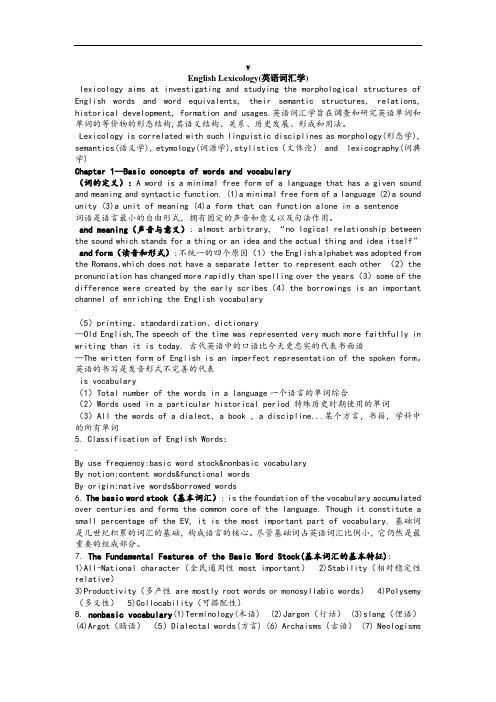
¥English Lexicology(英语词汇学)lexicology aims at investigating and studying the morphological structures of English words and word equivalents, their semantic structures, relations, historical development, formation and usages.英语词汇学旨在调查和研究英语单词和单词的等价物的形态结构,其语义结构、关系、历史发展、形成和用法。
Lexicology is correlated with such linguistic disciplines as morphology(形态学), semantics(语义学), etymology(词源学),stylistics(文体论) and lexicography(词典学)Chapter 1--Basic concepts of words and vocabulary(词的定义): A word is a minimal free form of a language that has a given sound and meaning and syntactic function. (1)a minimal free form of a language (2)a sound unity (3)a unit of meaning (4)a form that can function alone in a sentence词语是语言最小的自由形式,拥有固定的声音和意义以及句法作用。
and meaning(声音与意义): almost arbitrary, “no logical relationship between the sound which stands for a thing or an idea and the actual thing and idea itself” and form(读音和形式):不统一的四个原因(1)the English alphabet was adopted from the Romans,which does not have a separate letter to represent each other (2)the pronunciation has changed more rapidly than spelling over the years(3)some of the difference were created by the early scribes(4)the borrowings is an important channel of enriching the English vocabulary`(5)printing、standardization、dictionary—Old English,The speech of the time was represented very much more faithfully in writing than it is today. 古代英语中的口语比今天更忠实的代表书面语—The written form of English is an imperfect representation of the spoken form。
(英语词汇学)00832自考重点试卷(一)
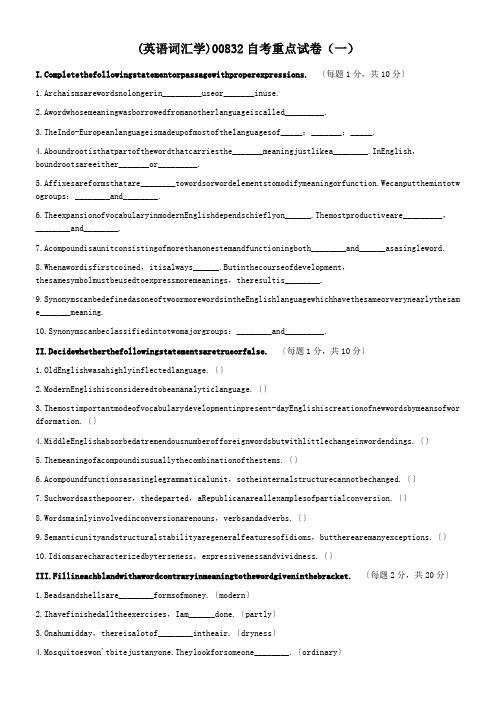
(英语词汇学)00832自考重点试卷(一)pletethefollowingstatementorpassagewithproperexpressions.〔每题1分,共10分〕1.Archaismsarewordsnolongerin_________useor_______inuse.2.Awordwhosemeaningwasborrowedfromanotherlanguageiscalled_________.3.TheIndo-Europeanlanguageismadeupofmostofthelanguagesof_____;_______;_____.4.Aboundrootisthatpartofthewordthatcarriesthe_______meaningjustlikea________.InEnglish,boundrootsareeither_______or_________.5.Affixesareformsthatare________towordsorwordelementstomodifymeaningorfunction.Wecanputthemintotw ogroups:________and________.6.TheexpansionofvocabularyinmodernEnglishdependschieflyon______.Themostproductiveare_________,________and________.7.Acompoundisaunitconsistingofmorethanonestemandfunctioningboth________and______asasingleword.8.Whenawordisfirstcoined,itisalways______.Butinthecourseofdevelopment,thesamesymbolmustbeusedtoexpressmoremeanings,theresultis________.9.SynonymscanbedefinedasoneoftwoormorewordsintheEnglishlanguagewhichhavethesameorverynearlythesam e_______meaning.10.Synonymscanbeclassifiedintotwomajorgroups:________and_________.II.Decidewhetherthefollowingstatementsaretrueorfalse.〔每题1分,共10分〕1.OldEnglishwasahighlyinflectedlanguage.〔〕2.ModernEnglishisconsideredtobeananalyticlanguage.〔〕3.Themostimportantmodeofvocabularydevelopmentinpresent-dayEnglishiscreationofnewwordsbymeansofwor dformation.〔〕4.MiddleEnglishabsorbedatremendousnumberofforeignwordsbutwithlittlechangeinwordendings.〔〕5.Themeaningofacompoundisusuallythecombinationofthestems.〔〕6.Acompoundfunctionsasasinglegrammaticalunit,sotheinternalstructurecannotbechanged.〔〕7.Suchwordsasthepoorer,thedeparted,aRepublicanareallexamplesofpartialconversion.〔〕8.Wordsmainlyinvolvedinconversionarenouns,verbsandadverbs.〔〕9.Semanticunityandstructuralstabilityaregeneralfeaturesofidioms,buttherearemanyexceptions.〔〕10.Idiomsarecharacterizedbyterseness,expressivenessandvividness.〔〕III.Fillineachblandwithawordcontraryinmeaningtothewordgiveninthebracket.〔每题2分,共20分〕1.Beadsandshellsare________formsofmoney.〔modern〕2.Ihavefinishedalltheexercises,Iam______done.〔partly〕3.Onahumidday,thereisalotof________intheair.〔dryness〕4.Mosquitoeswon'tbitejustanyone.Theylookforsomeone________.〔ordinary〕5.Ifyouwanttodrive,itis______tohaveadriver'slicense.〔unnecessary〕6.Thereisagreat_____inourpoliticalbeliefs.Weagreeonmostthings.〔difference〕7.Themansaid,“Iam________.Ididn'tdoit!”〔guilty〕8.Thesoldierstoodina______positionwhilethegeneralwalkedpasthim.〔relaxed〕9.Youwillhaveto______thestringinordertoopenthebox.〔tighten〕10.Noonelivesinthat______house.〔inhabited〕IV.Explainthefollowingterms:〔每题5分,共20分〕1.word2.affixes3.concept4.hyponymyV.Fillintheblankswiththefollowingverbalphrasesintheirsuitableforms:〔每题1分,共20分〕takeon;breakinto;biteinto;goabout;letout;drawup;setdown;holdonto;bringup;makeout;dryup;putout;livethrough;setoff;callfor;tearapart;buyoff;buildin;counton;sinkin1.1848wasayearofrevolutioninEurope;KarlMarxandFrederickEngelspublishedtheCommunistManifesto,andpoliticaldemonstration______thegreatcitiesofParis,Vienna,NaplesandBerlin.2.Withliberaldosesofcalomel,rhubarbandcastoroil,heslowlyimproved,andafterthreeweeks,he______histrousersandwaseagertoescapefromhisbed.3.Hetravelledtofoundlinghomes,prisonsandlunaticasylumsinhissearchforpeople.4.We________attopspeedthroughthenarrowstreetsofHiroshima.5.Iwasjustabouttomakemylittlebowofassent,whenthemeaningoftheselastwords_______,joltingmeoutofmysadreverie.6.Noonetalksaboutitanymore,andnoonewantsto,especially,thepeoplewhowerebornhereorwho______it.7.DuringdinnerMr.ChurchillsaidthataGermanattackonRussiawasnowcertain,andhethoughtthatHitlerwas______enlistingcapitalistandRightWingsympathiesinthiscountryandtheU.S.A.8.MyhusbandandIfindstrongsmokeoffensive.Wouldyoukindly_______that_______?9.Assumingthehotelmanwas______,theironlychance-aslimone-layinremovingthecarquickly.10.Whenrailroadsbegan______thedemandforsteamboatpilotsandtheCivilWarhaltedcommerce,MarkTwainleftthecountry.11.BythetimethetrialbeganonJuly10,ourtownof1500peoplehad_______acircus.12.AmongthemwasJohnButler,whohad_______theanti-evolutionlaw.13.Thenthecourt______astormofapplausethatsurpassedthatforBryan.14.Thefirst-andessential-stepinthestudyofanylanguageisobservingand______preciselywhathappenswhenn ativespeakersspeakit.15.By1976,theslumphadbegunto_______thebulk-carriertrade.16.Thekeytacticbehinditsstrategyof_______therichestsliceofthetradehasbeentomoveup-market-togowher etheThirdWorldcannotfollowintohigh-technologyinvestment.17.Sailorsandofficers______theirchoresasusualontheseships,amidpipingandloudspeakersquawks.18.Mr.Hopkinshas_______yourname.Heappearsimpressed,andthePresidenttoo,byyourexpertiseonlandingcraftandsoforth.19.He_________aSouthernwarwhoop.Inaflash,John,MckeanandFranklincrowdedaroundhim.20.Mr.Jefferson,Ican'tquite________whatitisyou'retalkingabout.VI.Questionsandanswers:〔每题10分,共20分〕1.Whatisextra-linguisticcontext?2.Whatisback-formation?本资料由广州自考网收集整理,更多自考资料请登录下载考试必看:自考一次通过的秘诀!。
全国英语词汇学(00832)高等教育自学考试试题与答案
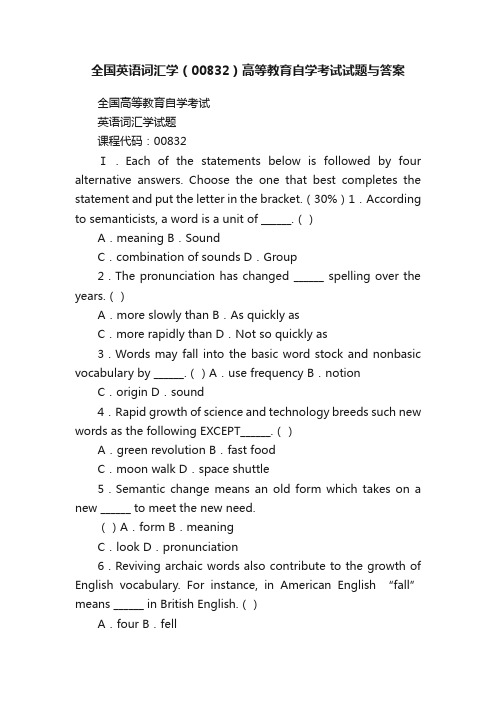
全国英语词汇学(00832)高等教育自学考试试题与答案全国高等教育自学考试英语词汇学试题课程代码:00832Ⅰ.Each of the statements below is followed by four alternative answers. Choose the one that best completes the statement and put the letter in the bracket.(30%)1.According to semanticists, a word is a unit of ______.()A.meaning B.SoundC.combination of sounds D.Group2.The pronunciation has changed ______ spelling over the years.()A.more slowly than B.As quickly asC.more rapidly than D.Not so quickly as3.Words may fall into the basic word stock and nonbasic vocabulary by ______.()A.use frequency B.notion C.origin D.sound4.Rapid growth of science and technology breeds such new words as the following EXCEPT______.()A.green revolution B.fast foodC.moon walk D.space shuttle5.Semantic change means an old form which takes on a new ______ to meet the new need.()A.form B.meaningC.look D.pronunciation6.Reviving archaic words also contribute to the growth of English vocabulary. For instance, in American English “fall” means ______ in British English.()A.four B.fellC.for D.autumn7.The plural morpheme “-s” is realized by /s/after the following sounds EXCEPT ______.()A./t/ B./g/C./p/ D./k/英语词汇学试卷第 1 页共9 页8.There are ______ free morphemic words in the following: bird, man, red, collection.()A.one B.twoC.three D.four9.The following words have derivational affixes EXCEPT ______.()A.works B.prewarC.postwar D.bloody10.30% to 40% of the total number of new words in English are produced through ______.()A.compounding B.affixationC.conversion D.shortening11.The word “motel” is created by ______.()A.compounding B.clippingC.blending D.suffixation12.“BBC” is formed in the way of ______.()A.acronymy B.clippingC.back-formation D.prefixation13.The types of meanings include the following EXCEPT ______.()A.grammatical meaning B.conceptual meaning C.associative meaning D.literal meaning14.By ______ motivation, we mean that the meaning of a word is related to its origin.()A.onomatopoeic B.morphologicalC.semantic D.etymological15.______ is the result of human cognition, reflecting the objective world in the human mind.()A.Reference B.ConceptC.Sense D.Motivation16.Semantic field, according to the course book, is also considered an integral part of ______.()A.word formation B.word meaningC.meaning change D.Sense relations英语词汇学试卷第 2 页共9 页17.When a word is first coined, it is always ______.()A.semantic B.onomatopoeicC.monosemic D.polysemic18.The following are all synonymous pairs, but in each the second is standard in usage whereas the first is archaic, EXCEPT ______.()A.ire/anger B.rich/wealthyC.forlorn/distressed D.bliss/happiness19.Shakespeare is difficult to understand than contemporary writings because many of his words were used in different ______ from what they have now in dictionaries.()A.senses B.FormsC.dialects D.T erms20.The mode of ______ is well reflected in the word “picture”, which originally denoted mere “painting”, but now has come to include “drawings” and even “photographs”()A.extension B.elevationC.narrowing D.degradation21.In the sentence “The old man, though poor, is a respectable gentleman.”, the word “respectable” is used in the ______ sense of transfer.()A.subjective B.objectiveC.sensational D.physical22.Which of the following is NOT one of the roles of context?()A.Elimination of ambiguity.B.Indication of referents.C.Provision of clues for inferring word-meaning.D.Provision of culture background for inferring word-meaning.23.The sentence “I lost Betty’s picture.” is ambiguous due to ______.()A.grammatical context B.polysemy C.antonymy D.hyponymy24.In the sentence “An east or north-east wind brings cold dry weather to England, but a sou’Wester usually brings rain.”, the meaning of “sou’wester” can be inferred from the clue of ______.()英语词汇学试卷第 3 页共9 页A.relevant details B.synonymyC.antonymy D.hyponymy25.The idiom “toss and turn” is a(n) ______ as far as rhetorical features of idioms are concerned.()A.alliteration B.metaphorC.metonymy D.rhyme26.Which of the following is NOT one of the types of idioms?()A.Sentence idioms. B.Idioms adverbial in nature.C.Clausal idioms. D.Idioms nominal in nature.27.The following are all variations of idioms, EXCEPT ______.()A.replacement B.additionC.shortening D.repetition28.Generally speaking, a dictionary will cover the following content EXCEPT ______.()A.spelling B.syntactical usage C.pronunciation D.definition29.As a general Chinese-English dictionary, ______ is the most complete and up-to-date, most elaborately treated one()A.A Chinese-English Dictionary (1995)B.Oxford Advanced Learner’s Dictionary of Current English with Chinese TranslationC.A New English-Chinese DictionaryD.Longman Dictionary of Contemporary English with Chinese Translation30.Collins COBUILD English Usage (1992), is a(n) ______ dictionary.()A.unabridged B.deskC.specialized D.encyclopedicⅡ.Match the words in Column A with the words in ColumnB according to 1) types of transfer; 2) rhetorical features of idioms;3) types of vocabulary by notion; and 4) the function of affixes. (10%)A B( c )31.She burst into passionate sobbing. A.juxtaposition(I )32.He drops off to sleep, the lamb. B.notional word 英语词汇学试卷第 4 页共9 页(g )33.and C.transfer of sensations(h )34.the man’s coat D.abstract to concrete( a )35.here and there E.derivational affix( b )36.moon F.alliteration( f )37.rough and ready G.functional word( e )38.ex-prisoner H.inflectional affix(j )39.fair and square I.associated transfer(d )40.Helen looks a fright in that old black dress. J.rhymeⅢ.Complete the following statements with proper words or expressions according to the course book.(10%)41.When we talk about a word in visual terms, a word can be defined as a ________ group of letters printed or written horizontally across a piece of paper.42.Modern English vocabulary develops through three channels: ________, semantic change and borrowing.43.We might say that free morphemes are free root.44.The formation of words by adding word-forming affixes to stems is called ________. 45.Semantic ________ refers to the mental associations suggested by the conceptual meaning ofa word.46.Perfect homonyms and polysemants are fully ________ with regard to spelling and pronunciation.47.V ocabulary is the most ________ element of a language as it is undergoing constant changes both in form and content.48.Ambiguity often arises due to ________ and homonymy.49.Idioms consist of set ________ and short sentences.50.Monolingual dictionaries are written in ________ language.Ⅳ.Define the following terms.(10%)51.morpheme52.homonym53.connotation54.elevation55.idiom英语词汇学试卷第 5 页共9 页Ⅴ.Answer the following questions. Your answers should beclear and short. Write your answers in the space given below.(20%)56.As far as growth of present-day English vocabulary is concerned, what are the three main sources of new words?57.What are the semantic features of compounds? Give an example to illustrate your point. 58.Decide whether the following statement is true or false, based on your understanding of the characteristics of antonyms. State your reason with one example.Contrary terms are non-gradable and allow intermediate members in between.59.How do you account for the context function as indication of referents?Ⅵ.Analyze and comment on the following. Write your answers in the space given below.(20%)60.Analyze the following dialogue and comment on the rhetoric use of homonym in italicized font.—“You’re not eating your fish,” a waitress said to a customer. “Anything wrong with it?”—“Long time no sea.” the customer replied.61.Analyze the three causes of meaning change within the scope of the linguistic factors, based on the given words below.(1)gold, bulb;(2)deer, beast, animals;(3)fortuitous, fruition.英语词汇学试卷第 6 页共9 页英语词汇学试卷第7 页共9 页英语词汇学试卷第8 页共9 页英语词汇学试卷第9 页共9 页。
2023年10月自学考试00832英语词汇学真题试题
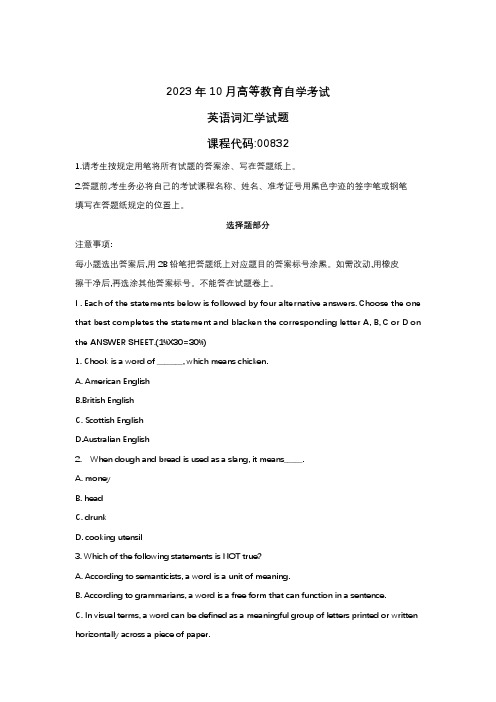
2023年10月高等教育自学考试英语词汇学试题课程代码:008321.请考生按规定用笔将所有试题的答案涂、写在答题纸上。
2.答题前,考生务必将自己的考试课程名称、姓名、准考证号用黑色字迹的签字笔或钢笔填写在答题纸规定的位置上。
选择题部分注意事项:每小题选出答案后,用2B铅笔把答题纸上对应题目的答案标号涂黑。
如需改动,用橡皮擦干净后,再选涂其他答案标号。
不能答在试题卷上。
I . Each of the statements below is followed by four alternative answers. Choose the one that best completes the statement and blacken the corresponding letter A, B, C or D on the ANSWER SHEET.(1%X30=30%)1.Chook is a word of _______, which means chicken.A.American EnglishB.British EnglishC.Scottish EnglishD.Australian English2.When dough and bread is used as a slang, it means_____.A.moneyB.headC.drunkD.cooking utensil3.Which of the following statements is NOT true?A.According to semanticists, a word is a unit of meaning.B.According to grammarians, a word is a free form that can function in a sentence.C.In visual terms, a word can be defined as a meaningful group of letters printed or written horizontally across a piece of paper.D. In terms of spoken language, a word is viewed as a sound or combination of sounds which are made involuntarily with human vocal equipment.4. Between 1250 and 1500, with Britain having trade relations with the low countries, especially Holland, as many as 2,500 words of _______origin found their way into English.A. FrenchB. DutchC. LatinD.Scandinavian5. Which of the following is the new word resulting from rapid growth of science and technology in the English vocabulary?A. fast foodB. TV dinnerC. moon walkD.stir fry6. The word denaturalization can be broken down into_minimal meaningful units.A. fourB. fiveC. sixD. seven7. In the word internationalists, the root is__.A. inter-B. -nation-C.-tion-D.-s8. The word antecedent can be broken down into________.A. ante-,-ced-, -entB.ante-,-ce-,-dentC. an-,-te-,-ced-,-entD.an-,-te-,-ce-,-dent9. Of the following words, the word“_____” does NOT have a derivational prefix.B. subseaC.contradictD. handcuff10. The formation of new words by converting words of one class to another class is called __.A. affixationB. functional shiftpoundingD. phrase clipping11. The majority of prefixes are characterized by their non-class-changing nature. Accordingly, we shall classify prefixes on a_____basis.A. morphemicB. morphologicC. syntacticD.semantic12. Of the following words, the word“_____”is NOT a deverbal noun formed by suffixation.A. decisionB. friendshipC.existenceD. protection13. The meanings of many words often relate directly to their origins. Such words have_____ motivation.A. onomatopoeicB. morphologicalC.semanticD.etymological14.The_meaning is the meaning given in the dictionary and forms the core ofword-meaning.A. grammaticalC. conceptualD. associative15. The word home, whose conceptual meaning is a “dwelling place”, reminds readers of their “family, friends, warmth, safety", etc. This shows the__meaning of a word.A. connotativeB. stylisticC. affectiveD. collocative16. The primary meaning of the word neck is_____.A. that part of the garmentB. the narrowest part of anything: bottle, land or channelC. that part of man or animal joining the head to the bodyD. a narrow part between the head and body or base of any object17. Which of the following pairs of antonyms belongs to contradictory terms?A. hot / warmB. sell/ buyC. husband / wifeD.true / false18. The pair of words flower /rose shows such a sense relation as_____.A. polysemyB. synonymyC. antonymyD. hyponymy19. The word butcher began with the meaning of “one who kills goats”, but now it means “one who kills animals”. This process is called____.A. extensionB. narrowingC.elevationD. degradation20. Which of the following words is an example of narrowing of word-meaning?A. disease (meaning: discomfort → illness)B. journal (meaning: daily paper→periodical)C. knight (meaning: servant→ rank below baronet)D. company (meaning: one who shares bread→ a company)21. From which of the following examples can we see transfer of sensations?A. the lip of a woundB. the hope of a familyC. pitiful and doubtfulD.sweet music22. Which of the following statements is NOT true about lexical context?A. It is one type of extra-linguistic context.B. It may provide clues for inferring word meaning.C. It refers to the words that occur together with the word in question.D. The meaning of the word is often affected and defined by the neighbouring words.23. What does the word quick mean in the following context?John, one of the group, has just told a joke. Everyone laughs except Adam. Then Adam laughs. One of the students says: I do think Adam's quick.A. Quick in development.B. Quick to hear the joke.C. Slow in learning things.D. Slow to understand the joke.24.What does the word do mean in the phrase do the flowers?A. work outB. brushC.arrangeD.study25.Which of the following is an idiom?A. Till the cows come home.B. Till the sheep come home.C. Till the horses come home.D. Till the pigeons come home.26.Which of the following is NOT a variation of idiom?A. synecdocheB. replacementC.dismemberingD. shortening27. As cool as a cucumber is a_____.A. true IdiomB. complete idiomC.semi-idiomD. regular combination28. Chop and change is an idiom ______in nature .A. verbalB. nominalC. adjectivalD. adverbial29. Collins COBUILD English Usage is a(n)______.A. unbridged dictionaryB. desk dictionaryC. pocket dictionaryD. specialized dictionary30. Which of the following is NOT usually included in the usage section of a dictionary?A. styleB. usage levelC. definitionD.colouring非选择题部分注意事项:用黑色字迹的签字笔或钢笔将答案写在答题纸上,不能答在试题卷上。
英语词汇学00832自考模拟试卷
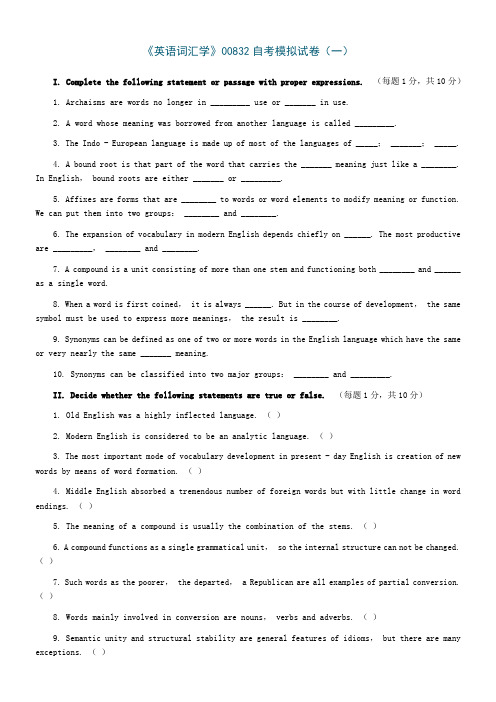
《英语词汇学》00832自考模拟试卷(一)I. Complete the following statement or passage with proper expressions.(每题1分,共10分)1. Archaisms are words no longer in _________ use or _______ in use.2. A word whose meaning was borrowed from another language is called _________.3. The Indo - European language is made up of most of the languages of _____; _______; _____.4. A bound root is that part of the word that carries the _______ meaning just like a ________. In English, bound roots are either _______ or _________.5. Affixes are forms that are ________ to words or word elements to modify meaning or function. We can put them into two groups: ________ and ________.6. The expansion of vocabulary in modern English depends chiefly on ______. The most productive are _________, ________ and ________.7. A compound is a unit consisting of more than one stem and functioning both ________ and ______ as a single word.8. When a word is first coined, it is always ______. But in the course of development, the same symbol must be used to express more meanings, the result is ________.9. Synonyms can be defined as one of two or more words in the English language which have the same or very nearly the same _______ meaning.10. Synonyms can be classified into two major groups: ________ and _________.II. Decide whether the following statements are true or false.(每题1分,共10分)1. Old English was a highly inflected language. ()2. Modern English is considered to be an analytic language. ()3. The most important mode of vocabulary development in present - day English is creation of new words by means of word formation. ()4. Middle English absorbed a tremendous number of foreign words but with little change in word endings. ()5. The meaning of a compound is usually the combination of the stems. ()6. A compound functions as a single grammatical unit, so the internal structure can not be changed. ()7. Such words as the poorer, the departed, a Republican are all examples of partial conversion. ()8. Words mainly involved in conversion are nouns, verbs and adverbs. ()9. Semantic unity and structural stability are general features of idioms, but there are many exceptions. ()10. Idioms are characterized by terseness, expressiveness and vividness. ()III. Fill in each bland with a word contrary in meaning to the word given in the bracket.(每题2分,共20分)1. Beads and shells are ________ forms of money. (modern)2. I have finished all the exercises, I am ______ done. (partly)3. On a humid day, there is a lot of ________ in the air. (dryness)4. Mosquitoes won't bite just anyone. They look for someone ________. (ordinary)5. If you want to drive, it is ______ to have a driver's license. (unnecessary)6. There is a great _____ in our political beliefs. We agree on most things. (difference)7. The man said, "I am ________. I didn't do it!" (guilty)8. The soldier stood in a ______ position while the general walked past him. (relaxed)9. You will have to ______ the string in order to open the box. (tighten)10. No one lives in that ______ house. (inhabited)IV. Explain the following terms:(每题5分,共20分)1. word2. affixes3. concept4. hyponymyV. Fill in the blanks with the following verbal phrases in their suitable forms:(每题1分,共20分)take on; break into; bite into ; go about; let out; draw up; set down; hold on to; bring up; make out; dry up; put out; live through; set off; call for; tear apart; buy off; build in; count on; sink in1. 1848 was a year of revolution in Europe; Karl Marx and Frederick Engels published the Communist Manifesto, and political demonstration ______ the great cities of Paris, Vienna, Naples and Berlin.2. With liberal doses of calomel, rhubarb and castor oil, he slowly improved, and after three weeks, he ______ his trousers and was eager to escape from his bed.3. He travelled to foundling homes, prisons and lunatic asylums in his search for people.4. We ________ at top speed through the narrow streets of Hiroshima.5. I was just about to make my little bow of assent, when the meaning of these last words _______,jolting me out of my sad reverie.6. No one talks about it any more, and no one wants to, especially, the people who were born here or who ______ it.7. During dinner Mr. Churchill said that a German attack on Russia was now certain, and he thought that Hitler was ______ enlisting capitalist and Right Wing sympathies in this country and the U. S.A.8. My husband and I find strong smoke offensive. Would you kindly _______ that _______?9. Assuming the hotel man was ______, their only chance - a slim one - lay in removing the car quickly.10. When railroads began ______ the demand for steamboat pilots and the Civil War halted commerce,Mark Twain left the country.11. By the time the trial began on July 10, our town of 1500 people had _______ a circus.12. Among them was John Butler, who had _______ the anti - evolution law.13. Then the court ______ a storm of applause that surpassed that for Bryan.14. The first - and essential - step in the study of any language is observing and ______ precisely what happens when native speakers speak it.15. By 1976, the slump had begun to _______ the bulk - carrier trade.16. The key tactic behind its strategy of _______ the richest slice of the trade has been to move up - market - to go where the Third World cannot follow into high - technology investment.17. Sailors and officers ______ their chores as usual on these ships, amid piping and loudspeaker squawks.18. Mr. Hopkins has _______ your name. He appears impressed, and the President too, by your expertise on landing craft and so forth.19. He _________ a Southern war whoop. In a flash, John, Mckean and Franklin crowded around him.20. Mr. Jefferson, I can't quite ________ what it is you're talking about.VI. Questions and answers:(每题10分,共20分)1. What is extra - linguistic context?2. What is back - formation?本资料由广州自考网收集整理,更多自考资料请登录下载考试必看:自考一次通过的秘诀!。
